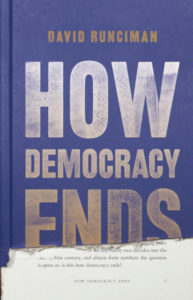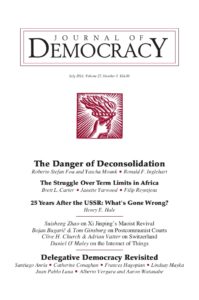 Democracy has long been the benchmark of Westernization, notes Adam Tooze, Professor of History and the Director of the European Institute at Columbia University. Talk of a crisis in democracy has relevance precisely because the rise of the Chinese economy under Communist Party leadership puts that benchmark in question, he writes in The New York Review of Books. David Runciman’s How Democracy Ends is reassuring at one level, he adds:
Democracy has long been the benchmark of Westernization, notes Adam Tooze, Professor of History and the Director of the European Institute at Columbia University. Talk of a crisis in democracy has relevance precisely because the rise of the Chinese economy under Communist Party leadership puts that benchmark in question, he writes in The New York Review of Books. David Runciman’s How Democracy Ends is reassuring at one level, he adds:
Democracy is unlikely to die with a bang. But all the more likely is the possibility that it will expire with a whimper. There doesn’t seem to be the level of national solidarity that would be required to address the challenge of mounting inequality by raising income and wealth taxes or undertaking comprehensive welfare reform—the reforms that were the achievements of the mid-twentieth century and that were in large part spurred by the huge mobilization efforts of the two world wars. …. Democracy has no clear answer for the mindless operation of bureaucratic and technological power. We may indeed be witnessing its extension in the form of artificial intelligence and robotics.
 “Bureaucratic overreach and environmental catastrophe are precisely the kinds of slow-moving existential challenges that democracies deal with very badly,” Tooze contends. And given the West’s failure to address them, we should expect to see ever-louder calls for energetic authoritarian answers.”
“Bureaucratic overreach and environmental catastrophe are precisely the kinds of slow-moving existential challenges that democracies deal with very badly,” Tooze contends. And given the West’s failure to address them, we should expect to see ever-louder calls for energetic authoritarian answers.”
Other books reviewed:
The People vs. Democracy: Why Our Freedom Is in Danger and How to Save It by Yascha Mounk [a contributor to the NED’s Journal of Democracy]; How Democracies Die by Steven Levitsky and Daniel Ziblatt; The Road to Unfreedom: Russia, Europe, America by Timothy Snyder.







